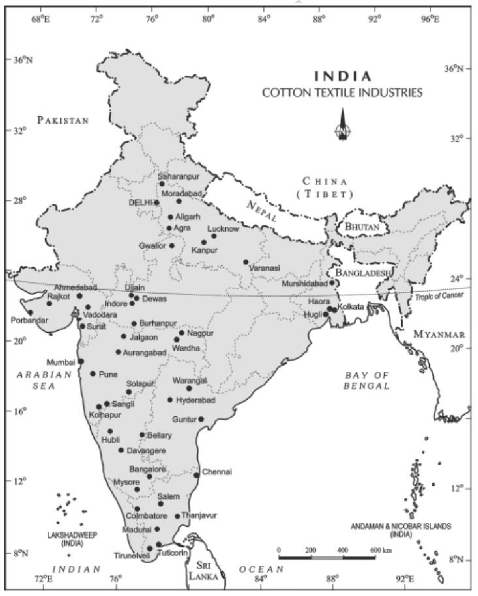3.3.2. Cotton textile Industry
The cotton textile industry is one of the traditional industries of India. The development of this industry in India was due to several factors. One, it is a tropical country and cotton is the most comfortable fabric for a hot and humid climate. Second, large quantity of cotton was grown in India. Abundant skilled labour required for this industry was available in this country.
The first modern cotton mill was established in Mumbai in 1854. By 1947, the number of mills in India went up to 423 but the scenario changed after partition when large number of mills had gone to West Pakistan. The cotton textile industry in India can be broadly divided into two sectors, the organised sector and the decentralised sector. The decentralised sector includes cloth produced in handlooms (including Khadi) and power looms.

Cotton is a “pure” raw material which does not lose weight in the manufacturing process. So other factors, like, power to drive the looms, labour, capital or market may determine the location of the industry. At present the trend is to locate the industry at or close to markets, as it is the market that decides what kind of cloth is to be produced. Also the market for the finished products is extremely variable; therefore, it becomes important to locate the mills close to the market.

In the second half of the nineteenth century, the cotton textile industry expanded very rapidly throughout the country. Thus, the cotton textile industry is located in almost every state in India, where one or more of the locational factors have been favourable. Presently Maharashtra, Gujarat and Tamil Nadu are the leading cotton producing states. West Bengal, Uttar Pradesh, Karnataka, and Punjab are the other important cotton textile producers. Tamil Nadu has the largest number of mills and most of them produce yarn rather than cloth.
Although cotton textile is one of the most important industries of India, it suffers from many problems. Some of the burning problems include- (1) Scarcity of raw materials; (2) Obsolete Machinery; (3) Erratic power supply; (4) Low productivity of labour; (5) Labour strikes; (6) Stiff Competition in domestic and international market; (7) Sick Mills; (8) Lack of finance.
